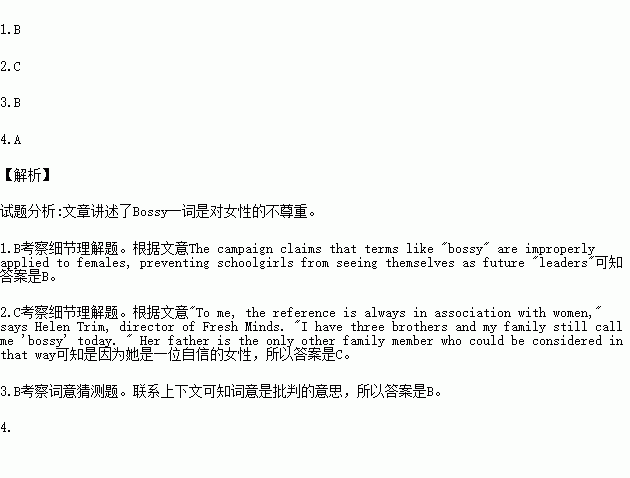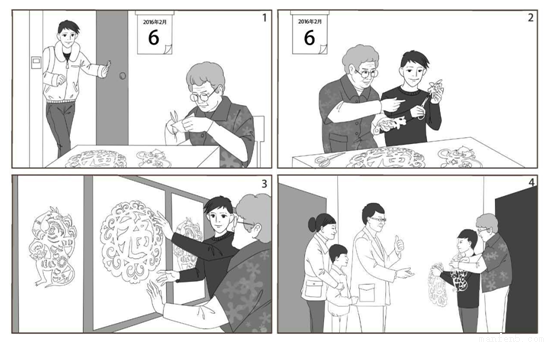题目内容
Face-book chief operating officer Sheryl Sandberg and Anna Maria Chavez, chief of American Girl Scouts, are leading a campaign to discourage the use of the word “bossy”. Does the term destroy the confidence of young girls?
The campaign claims that terms like “bossy” are improperly applied to females, preventing schoolgirls from seeing themselves as future “leaders”. From its first application, the word has been definitely connected more with women than with men. It first appeared in 1882,according to the Oxford English Dictionary, mentioning “a lady manager who was extremely bossy”. As late as 2008, the word appeared in reference to females four times more often than males, claim the Ban Bossy campaigners. “To me, the reference is always in association with women,” says Helen Trim, director of Fresh Minds. “I have three brothers and my family still call me ‘bossy’ today. ” Her father is the only other family member who could be considered in that way, says Trim,but nobody would ever call him so.
Some educators recommend that the word should be reclaimed, rather than banned. “But the thing with ‘bossy,is that there’s an infantile (幼稚的)element to it,” says Sara Mills, professor at Sheffield University. “You think of 'bossy' as being like a little kid who's claiming more than he has the right to claim. ”
It's not just “bossy” under fire. “Pushy” is another Face-book chief operating officer Sheryl Sandbergtarget. The implication is that women shouldn’t present themselves as powerful and confident, Mills suggests, which some women are willing to listen to and accept. Trim points out that many modern female business role models are able to be bosses without being labeled ‘bossy'. And she rarely, if ever,hears the word used within her company. But she says that the damage may be done much earlier in a woman’s life. “It does come about from those early teenage years. ” she says. “I think it’s impossible to ban a word, but if people are replacing it with words like 'confidence' or ‘assertiveness’,we would all be in a much better place. ”
1.More evidence is provided to show "bossy" is more applied to females by _ .
A. the Oxford English Dictionary
B. the Ban Bossy campaigners
C. Helen Trim at Fresh Minds
D. some experts in education
2. Trim's family still consider her bossy because .
A. she is expected to lead in her family
B. she is the boss of her company
C. she is a powerful and confident female
D. her father considers her that way
3.The underlined part "under fire most probably means .
A. definitely replaced
B. strongly criticized
C. improperly applied
D. eagerly expected
4.How does the author sound when referring to the campaign against "bossy"?
A. Objective. B. Angry.
C. Doubtful D. Optimistic.


 ),并在其下面写出该加的词。
),并在其下面写出该加的词。